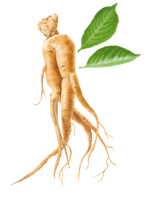Ginseng
 Overview
Overview
Ginseng is widely known as “the king of herbs,” and for good reason. Ginseng is currently the best known of any of the botanical medicines throughout the world. With at least five different types of ginseng plants, each of the plants has varying chemical properties. These types include:
- Panax ginseng – Grown in China for thousands of years. The name is derived from the Latin word “panacea,” which means “cure all.”
- American ginseng – This type is known to grow in the woods of eastern North America all the way from the Carolinas to Canada. Ginseng root is available as a whole root, a liquid extract, a powdered extract, tea, tinctures, capsules and tablets.
Chemical Components
Studies conducted in China (where ginseng is very popular) show that panax ginseng has at least 28 different ginsenosides which provide beneficial effects on the cardiovascular system, the central nervous system, endocrine secretion, and promote the body’s immune function. Ginseng is also known to relieve stress and have anti-aging properties.
This herb appears to help regulate adrenaline secreted by the adrenal glands. It also helps prevent the typical shrinking of the adrenal glands due to prolonged stress, aging, and the use of corticosteroid drugs.
Ginseng helps protect the liver by increasing cell growth in the liver, and is also thought to prevent nerve damage due to radiation.
Ginseng also has properties which lower total cholesterol, particularly low-density lipoproteins (bad cholesterol) and increases HDL, or good cholesterol.
Uses
Ginseng can be used as a tonic to stimulate and rejuvenate the body. Ginseng is frequently used as part of formulas which are meant to balance the menstrual cycle, improve sex drive and fertility, and to reduce premenstrual symptoms and hot flashes.
However, the most common use for ginseng is simply to increase energy. These rejuvenating qualities may stem from ginseng’s stimulus to protein synthesis.
Dosage
The daily dosage for ginseng is typically about 500 mg.
Adverse Reactions
Doses larger than 500 mg may result in overstimulation, leading to high blood pressure, diarrhea, insomnia and skin eruptions. Because ginseng is thought to interact with the hormonal system, it may also aggravate fibrocystic breast disease when taken in doses which are too large.
References
- Bratman, S. The Alternative Medicine Ratings Guide: an expert panel rates the best treatments for over 80 conditions, Prima Health A Division of Prima Publishing (1998)
- Brown, L. Alternative Medicine, NTC/Contemporary Publishing (1999)
- Deepak Chopra, M.D. Alternative Medicine: The Definitive Guide, Celestial Arts (2002)
- Duke, J. The Green Pharmacy: Herbal remedies for common diseases and conditions from the world's foremost authority on healing herbs,Rodale Limited (2003)
- Nancy Allison. The Illustrated Encyclopedia of Body-Mind Disciplines, The Rosen Publishing Group (1999)
- Servan-Schreiber, D. The Encyclopedia of New Medicine: Conventional & Alternative Medicine For All Ages, Rodale International Limited (2006)
Posted in Ginseng
Ask a Question Or Join a Discussion


